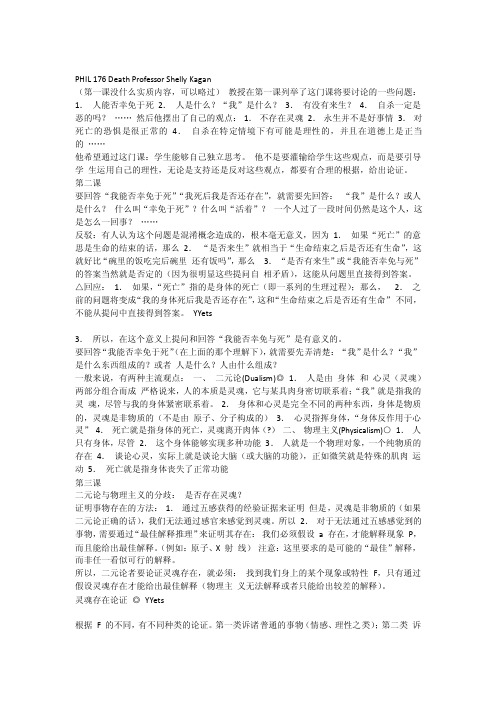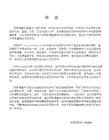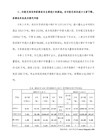耶鲁大学开放课程—哲学:死亡.05.Open.Yale.course—Philosophy:Death.DivX-YYeTs人人影视 [字幕转换助手
《耶鲁大学公开课:死亡》笔记

《耶鲁大学公开课:死亡》笔记我们可以把这第一种观点称为二元论物质实体。
命令肉体。
但另一方面,灵魂也会受到肉体的反作用。
一方面,我们言谈间好像灵魂是有处所的,我们说灵魂在肉体中。
另一方面,也许这都是幻觉,也许灵魂根本没有任何处所,也许我有一个处所的感受,实际上只是我从我的肉体获得的所有感觉输人形成的幻觉。
我们还有物理主义者的观点。
物理主义者也相信心灵,但是他们认为,心灵只是一种谈论肉体能力的方式。
物理主义者当然不相信二元论者信奉的非物质的灵魂。
所以为了区分清楚,我将说物理主义者根本不相信灵魂。
他们相信心灵,但是不相信灵魂。
第三章灵魂存在的论证对于我们看不见(又听不见、尝不到,也无法用内感官观察到)的东西,我们该如何去证明它们的存在呢?最重要的方法也许是这样的:有时我们合理地设定存在某种我们看不见的东西,以便去解释我们都认同其存在的其他事情。
关于最佳解释推论,在此要强调一下。
我们可以合理地相信某事物,不仅是因为我们需要靠它提供某种解释,而是由于它能提供我们可以得到的最佳解释。
的肉体的生命。
纯粹的机器不能思考、推理,也没有信念和欲望。
即使是在解释思考、推理和计划时,好像我们也并不需要诉诸灵魂。
如果我真的有自由意志,那我就不可能受制于决定论法则。
换句话说,受制于决定论法则的东西不可能拥有自由意志。
这两者是不相容的。
也许能够想象出来某种事物,并不一定代表该事物具有逻辑上成立的可能性。
想象力是逻辑成立可能性的正确向导,也就是说,但凡我们能够想象出来,便具有逻辑上成立的可能。
没准想象力是逻辑成立的可靠向导,但凡能想象出来的,就具有逻辑成立的可能。
即使我们同意柏拉图的理念存在,即使我们也同意灵魂存在并且可以被思考,·我们还没有得到任何充分的理由去相信灵魂一定是不朽的。
因此,柏拉图的第一个论证—由理念本质引起的论证—我认为是站不住脚的。
组成部分的事物可以被毁灭。
事实上,柏拉图本人在其他对话录中,反对灵魂的单纯性。
耶鲁大学开放课程—哲学:死亡.15.Open.Yale.course—Philosophy:Death.DivX-YYeTs人人影视 [字幕转换助手

But think of the various periods during the night
的各个不同时段
in which you are in a deep, deep dreamless sleep.
你并没有在思考
You're not thinking.
我们是不是只能说我死了
do we have to then say I'm dead?
那似乎是定义死亡的最自然的方式
Well, that may seem to be the most natural way to define death,
但不可取
but it's not an acceptable approach.
So we need to revise our account of what it is
一个人死亡的具体含义
on the physicalist picture to say that you're dead.
死亡到底意味着什么
What is it to be dead?
不可能只是不再运行人体功能
之前我们区分了肉体的死亡
Previously, we distinguished between the death of my body
和作为人的死亡
{\c
现在我们来着重研究作为人的死亡
let's focus on my death as a person.
如果我没有运行人体功能
If I'm not P-functioning,
On Judgment Day, God resurrects the dead.
耶鲁大学公开课:死亡哲学

耶鲁大学公开课:死亡哲学
播放中
[第1课]课程介绍
[第2课] 人的本质:二元论与物理主义
[第3课] 灵魂存在与否的论证(一)
[第4课] 柏拉图对话录《斐多篇》介绍(一),灵魂存在与否的论证(二)
[第5课] 灵魂存在与否的论证(三):自由意志与濒死体验
[第6课] 灵魂存在与否的论证(四):柏拉图(二)
[第7课] 柏拉图 (二) :灵魂永恒与否的论证
[第8课] 柏拉图 (三) :灵魂永恒与否的论证(续)
[第9课] 柏拉图 (四) :灵魂永恒与否的论证(续)
[第10课] 人格同一性(一):跨越时空的同一性和灵魂理论
[第11课] 人格同一性(二):肉体理论及人格理论
[第12课] 人格同一性(三):人格理论的异议
[第13课] 人格同一性(四):本质因素何在?
[第14课] 本质因素何在(续)、死亡的本质(一)
[第15课] 死亡的本质(续):请相信你将死去
[第16课] 独自死亡、死亡之害(一)
[第17课] 死亡之害(二):剥夺性解释
[第18课] 死亡之害(三):不朽性(一)
[第19课] 不朽性(二):生命的价值(一)
[第20课] 生命的价值(二):死亡的其它坏处(一)
[第21课] 死亡的其它坏处(二)
[第22课] 对死亡的恐惧
[第23课] 如何面对死亡
[第24课] 自杀(一):自杀的合理性
[第25课] 自杀(二):犹豫不决的决定
[第26课] 自杀(三):自杀的道德评判以及全章总结。
耶鲁大学公开课《死亡》详细笔记

PHIL 176 Death Professor Shelly Kagan(第一课没什么实质内容,可以略过)教授在第一课列举了这门课将要讨论的一些问题:1.人能否幸免于死2.人是什么?“我”是什么?3.有没有来生?4.自杀一定是恶的吗?……然后他摆出了自己的观点:1.不存在灵魂2.永生并不是好事情3.对死亡的恐惧是很正常的4.自杀在特定情境下有可能是理性的,并且在道德上是正当的……他希望通过这门课:学生能够自己独立思考。
他不是要灌输给学生这些观点,而是要引导学生运用自己的理性,无论是支持还是反对这些观点,都要有合理的根据,给出论证。
第二课要回答“我能否幸免于死”“我死后我是否还存在”,就需要先回答:“我”是什么?或人是什么?什么叫“幸免于死”?什么叫“活着”?一个人过了一段时间仍然是这个人,这是怎么一回事?……反驳:有人认为这个问题是混淆概念造成的,根本毫无意义,因为1.如果“死亡”的意思是生命的结束的话,那么2.“是否来生”就相当于“生命结束之后是否还有生命”,这就好比“碗里的饭吃完后碗里还有饭吗”,那么3.“是否有来生”或“我能否幸免与死”的答案当然就是否定的(因为很明显这些提问自相矛盾),这能从问题里直接得到答案。
△回应:1.如果,“死亡”指的是身体的死亡(即一系列的生理过程);那么,2.之前的问题将变成“我的身体死后我是否还存在”,这和“生命结束之后是否还有生命”不同,不能从提问中直接得到答案。
YYets3.所以,在这个意义上提问和回答“我能否幸免与死”是有意义的。
要回答“我能否幸免于死”(在上面的那个理解下),就需要先弄清楚:“我”是什么?“我”是什么东西组成的?或者人是什么?人由什么组成?一般来说,有两种主流观点:一、二元论(Dualism)◎1.人是由身体和心灵(灵魂)两部分组合而成严格说来,人的本质是灵魂,它与某具肉身密切联系着;“我”就是指我的灵魂,尽管与我的身体紧密联系着。
2.身体和心灵是完全不同的两种东西,身体是物质的,灵魂是非物质的(不是由原子、分子构成的)3.心灵指挥身体,“身体反作用于心灵”4.死亡就是指身体的死亡,灵魂离开肉体(?)二、物理主义(Physicalism)○1.人只有身体,尽管2.这个身体能够实现多种功能3.人就是一个物理对象,一个纯物质的存在4.谈论心灵,实际上就是谈论大脑(或大脑的功能),正如微笑就是特殊的肌肉运动5.死亡就是指身体丧失了正常功能第三课二元论与物理主义的分歧:是否存在灵魂?证明事物存在的方法:1.通过五感获得的经验证据来证明但是,灵魂是非物质的(如果二元论正确的话),我们无法通过感官来感觉到灵魂。
耶鲁大学开放课程—哲学:死亡

不同的手段导致死亡的方式不同,但是我认为有一点是相同的,你的死亡伴随着这一系列的事情发生,都是些什么事呢?事实上我对这方面不是很了解。
我只能认为是不论最初的死亡原因是什么,最后血液不再流动,氧气不能输送到全身,导致大脑变得缺氧,由于细胞中缺少氧气,所以细胞不能完成它们的各种新陈代谢活动,因此他们不能修复各种损伤,或者生成所需的氨基酸蛋白质,当细胞开始衰退,细胞组织开始损坏,它们不能像正常的细胞一样修复,结果就是重要的细胞组织衰竭了,瞬间肉体死亡了,我想说我不是很确定这个是不是真的。
刚才讲的那个小故事是不是真的。
但是有些类似的故事就可能是真的。
从哲学的观点来看,我已经把整个过程画在了黑板上。
由于我不知道某些具体的生理过程,我们可以叫它B1 B2 B3一直到Bn ,在B1之前你的身体还在运作,正常运作也就是机体的呼吸复制细胞诸如此类。
在这个过程的最后也就是Bn 身体死亡了,B是指身体B1到Bn 这就是死亡的过程至少这是身体上的死亡。
就像我说的这就是一些医学院的人生物学家或生理学家向我们描述的死亡。
然而问题又来了,假设我们叫这个过程“肉体死亡”,把这些发生在最后阶段的事称做肉体死亡。
■■■这门课的成绩会由以下几部分构成:平时作业占20%,期中考试占30%,期中有时在10月份考,期末考试占50%;这就是成绩的加权比例。
我还有另外一套评分计划叫“特赦计划”,就是我会比较你的学期总成绩和你的期末考试成绩,我会取这两个成绩中更高的作为你的课程最终成绩。
……接下来学好物理最重要的就是完成作业,作业的权重虽然只有20%,但这个数字是无法真正衡量其重要性的,作业能让你真正弄清楚自己对知识的掌握程度,如果你只看我在黑板上的推导,觉得很有道理,好象自己也能行,但是只有你动手去解题,才是验证自己会与不会的唯一方法。
只有这个时候你才知道自己是否真正理解了,所以,我要求你们按时按量地完成作业。
如果我周三布置了关于该周课堂内容的作业,你们应该尽快着手去做,因为当你下周来上新课时我会假设大家都已经把上周题目做完了。
耶鲁大学公开课:死亡

耶鲁大学公开课:死亡卡根的反驳耶鲁大学哲学教授谢利?卡根讲授的公开课“死亡”颇受欢迎,原因大概有二:一是这位教授的形象招人喜爱,他一脸的络腮胡,上课时穿着牛仔裤和运动鞋,有时还会盘腿坐到讲台上;第二就是他讲的主题了,虽然公开课都是导论性质的课程,但卡根的死亡公开课并不易懂。
他坦承:“其中一些材料是很难懂的,有些思想可能很难一下就把握住。
如果你有时间的话,把某些部分读上两遍会很有帮助。
”卡根在课上也会讲些笑话,比如他介绍说,美国喜剧演员菲尔兹说,希望他的墓碑上写的是:“我宁愿待在费城(而非长眠于此)。
”他提到了卡夫卡等作家的作品,但大部分时间都是在不遗余力地分析和反驳跟他对立的立场。
卡根显然是一位训练有素的分析哲学家,听他的课需要很强的思辨能力。
他会还原一个命题的完整论证过程,考虑它的各种合理性,然后逐一加以反驳。
他使用了最佳解释推论、两难推理、类比等各种论证方法。
他的讲稿一共16章,前半部分讨论的是关于死亡的形而上学问题,如身心关系、人格同一性等,后半部分是价值理论,读到后半部分才会比较轻松。
卡根上来就亮出了他的基本观点:世上没有非实质的、不朽的灵魂,我们只是躯体,当我们的躯体死亡时,意味着我们的存在宣告终结,而且永生并不是值得追求的目标。
他最后又总结了一遍:“我们只是机器,当然我们不是随便什么机器,我们是神奇的机器,是有感情、有梦想、有创造力的机器。
死亡不是什么难以理解的巨大谜题,死亡并不比你的灯泡或者电脑坏掉更神秘……对死亡的恐惧是一种不恰当、不合理的反应。
我邀请你在面对死亡时能无所畏惧,不存幻想。
”在反驳灵魂存在的说法时,卡根使用了“最佳解释推论”:对于看不见的东西,我们如何证明它们存在呢?如果设定某种我们看不见的东西的存在,能帮助我们最佳地解释用其他方法无法解释的事物,我们就推论说这些事物是存在的。
这种论证被称为“最佳解释推论”。
比如我们相信存在着病毒和细菌,因为这样我们就能解释人们为什么会生病。
耶鲁大学开放课程—哲学:死亡.25.Open.Yale.course—Philosophy:Death.DivX-YYeTs人人影视

,但后来又好了but you recover.
,你重新过上有价值的生活You're going to return to a life that's worth having.
,你的生活从值得过下去where you go from a life worth living
,变成不值得过下去to a life not worth living
,并且一直持续下去and it stays there.
,但假如不是这样But suppose instead,
,情况是这样的we have a situation like this.
,不值得过下去的日子的唯一方法the later chunk not worth living,
,如果这段日子足够短at least if that chunk's small enough--
,假设是这样的suppose it was like this
,你会说 这么早自杀不合情理you'd say it doesn't make sense to kill yourself this early.
,代表你生活的起落沉浮about your life doing better or worse,
,每个都标注了and noted for each one of them,
,在哪个时间点 如果有的话at what point, if ever,
,自杀也许是合理的选择suicide might be a reasonable choice.
耶鲁大学开放课程—哲学:死亡.21.Open.Yale.course—Philosophy:Death.DivX-YYeTs人人影视

某人偶然间Indeed, one occasionally
在报上读到reads in the newspaper about this sort of thing
可以对这些疾病如此检测where you can get tested for such and such a disease.
就在他等待电梯上来的时候a minute and a half goes by
一分半钟已经悄然间逝去了while he's waiting for the elevator to come.
如果你知道你的生命还有一年或者两年If you knew you had a year left or two years left,
这是个很有效的测试it's sort of a useful test for asking yourself
反问自己 生命中哪些事是有价值的what are the things you must value in life--to ask,
如果你知道自己还有what would you choose to do if you knew you had
上节课我们开始探讨All right. Last time we started asking ourselves
到底是死亡的哪些因素about what are some of the other aspects of death that
可能使它产生危害 或者说might contribute to its badness, or
年 年 年 等等, , and so forth.
耶鲁大学开放课程—哲学:死亡.20.Open.Yale.course—Philosophy:Death.DivX-YYeTs人人影视

到人们对事物的主观认知of what it would be like having identical experiences
对真实世界进行全方位复制to the ones you would have if you were really doing--
但你并没在书写精彩的美国小说but you're not writing the great American novel.
你只是泡在那儿You're just floating there.
你想找到治愈癌症的方法You wanted to be finding the cure for cancer,
这不是人类理想的生存方式It's not the ideal of human existences;
这不是我们理想中最好的生活方式it's not the best possible life we can imagine ourselves having.
但若我们认为缺了什么东西的话But that means, if we think something's missing,
在"体验机"中的生活就是完美的perfect as long as you've got the right tape playing.
但是大多数人都会说 不对But the vast majority always says, no,
这种生活里缺失了一些东西there's something missing from that life.
耶鲁大学开放课程—哲学:死亡.09.Open.Yale.course—Philosophy:Death.DivX-YYeTs人人影视 [字幕转换助手

it would follow that it was indestructible and,
从而实现灵魂不朽
hence, immortal.
柏拉图问到 有什么证据能
He asks, what's our evidence
证明某些东西是不可摧毁的呢
for some things being indestructible?
我还花时间给大家讲了
And I spent a fair bit of time suggesting
如果仔细推敲柏拉图对不可见下的定义
that if you pin down precisely what Plato means by invisible,
这条论证实际上并不成立
the argument doesn't actually go through.
但至少表明 我们不应对这条假设
but at least suggests that we shouldn't be so ready to assume
确信无疑
that sort of position is correct.
在著名的《理想国》一书中
In The Republic, famously,
in which Plato tries to argue for the simplicity of the soul.
你们还记得这一系列观点就是
The set of connected ideas, you'll recall, were these:
柏拉图想说明
that Plato wants to suggest that
耶鲁大学开放课程—哲学:死亡.11.Open.Yale.course—Philosophy:Death.DivX-YYeTs人人影视 [字幕转换助手

That's what the body theory says.
不像灵魂理论那么神秘
And unlike souls, where it's all rather mysterious
你很难辨别灵魂
how you could tell whether soul swapping
不能排除这种可能
Nothing rules out the possibility that
即肉体同一是
having the very same body
成为同一个人的关键
is the key to being the very same person over time.
即使你相信灵魂存在
"Well what's the alternative?"
自然而然 另一个观点就是
Now, the natural alternative is to say,
"成为同一个人的关键
"The key to being the same person
不是灵魂的一致性
is not the sameness of the soul,
且不论灵魂存在与否
whether or not it exists,
而是拥有同一肉体"
but rather having the very same body."
再说一遍 我不打算
And again, although I'm not going to
反复讨论这个问题
go on and on about this point,
耶鲁大学公开课:死亡

谢谢观看
推荐
推荐
★最受欢迎的国际名校三大公开课之一,总点击量超过数亿次。
★最像顽童的耶鲁大学教授谢利·卡根,穿着牛仔裤、帆布鞋,盘腿坐在讲台上和大家侃侃而谈的形象深入 人心,成为国内年轻人追捧的“明星教授”。
★死亡是“生的局限性”,是生命的参照物,唯有了解死亡,生命的可贵才能彰显。直面死亡、思考死亡, 就是思考人生。
那么,我们将讨论什么呢?我们将讨论开始思考死亡的本质时出现的哲学问题,诸如:我们死亡时发生了什 么?不过,为了着手谈论这一问题,我们首先要思考:我们是什么?人是怎样的一种实体(entity)?尤其是, 我们有灵魂(soul)吗?
在一开始,我还要解释一下,在本书中我把“灵魂”当作一个哲学术语来使用。我用“灵魂”一词指某种非 物质的(immaterial)、完全不同于我们肉体(body)的东西。
耶鲁学公开课:死亡
2014年北京联合出版公司出版的图书
01 内容简介
03 作者简介 05 推荐阅读
目录
02 推荐 04 目录
基本信息
最受欢迎的国际名校三大公开课之一,倍受欢迎的明星教授卡根,带我们理性思考人生最重要的课题。了解 死亡,生命的可贵才能彰显。
内容简介
内容简介
耶鲁大学公开课:死亡有件事是确定无疑的:最终我们都会死亡。 但我们真的相信自己会死吗? 人是否有不朽的灵魂? 死亡是生命的真正终结吗? 如果死后不再存在,死亡就是全然的坏事吗? 永生是值得期待的吗? 在某些情况下放弃生命是否可能合理并符合道德? 对死亡的恐惧是明智的吗? 如何面对“终有一死”这个无法违背的事实? 死亡意识如何影响我们的生活方式? ……
死亡是我们最重要的课题,因为所有的生命都指向终点,我们每一天都离终点更近一些,这是在所有形式的 生命体中,最为确定无疑的事。
耶鲁大学开放课程—哲学:死亡03OpenYalecourse—Philosophy:

without actually having a canonical list.
只是把它们视为人具备的能力
Just think of them as the set of abilities that people have,
作为人有别于粉笔 收音机
the things that we can do that other physical objects-- chalk, radios,
人人影视
可以从事一系列特定的活动
can do a certain array of activities.
人是可以思考 可以互相交流的肉体
People are bodies that can think, that can communicate,
他有理性 可以规划 可以感知
校对监制:柠檬meg 幻影飞 梁良
我们探讨了两种观点
with regard to the question, "What is a person?"
一种是二元论的观点
{\c
上堂课上我们用了很长的时间来介绍它
that's the view that we spent a fair bit of time sketching last meeting.
that are rational, that can plan, that can feel things,
有创新等各种能力
that can be creative, and so forth and so on.
我们可以探究一下
Now, we might argue about
耶鲁大学开放课程—哲学:死亡

中文名: 耶鲁大学开放课程—哲学:死亡英文名: Open Yale course—Philosophy:Death资源格式: RMVB版本: [YYeTs人人影视出品][中英双语字幕][更新到20集] 发行日期: 2009年8月4日地区: 美国对白语言: 英语文字语言: 简体中文,英文简介:课程类型:哲学独立字幕下载:/listsubtitle.html课程介绍:这次讲课的教授是个大仙.他那么"朴素",我是说他的坐姿那么朴素,因为人类自古就是那样坐的,盘腿坐.不过他是盘腿坐在讲台上,这就不是很朴素了,因为古代没有桌子,大家都坐在地上。
我大学的时候,美国老师屁股一扭坐在课桌或讲台上,我们这些有着“师道尊严”的中国人是很“友邦惊诧”的,但时间长了就习惯了。
英国人不这样,他们总那么严谨严肃,有点象中国人——但千万别真的以为英国人象中国人,与其说英国人与中国人象,不如说美国人与中国人更象一些:都很粗俗豪放,并且中国与美国越来越象了。
这老师穿着鞋子直接盘腿坐在讲台上,还好他穿的球鞋很白很干净,不太碍眼。
他长得有点象撒达姆大叔,还满脸胡须,但他个子很小,所以他要坐在桌子上才能显眼一些,台下据说有150-180名学生,是个大教堂,要我个子那么小我也“坐”桌子上。
他常说,we are sitting here to ...,确实彼此都“坐着”,很平等。
相比古代的大师,比如柏拉图或佛都是如此随意开讲座谈生死的吧。
看着他那样手舞足蹈的乱说一气,我觉得很舒服。
这大叔一定是个很怪的人,这从一开课就看出来了。
不过不会特别怪,因为这里毕竟是耶鲁,我是说,假如他有精神病啊什么的偏差,心理学院的老师们肯定就早就派上用场了。
他一上来就说,别管我叫什么什么“教授”,我喜欢听你们叫我shelly。
从他的简历看,他应该是个伦理学专家,写过一些这方面的书籍。
今天香港著名艺人肥姐逝世,这就是活生生的死亡。
死亡对普通人意味着什么?死亡对哲学家又意味着什么?实际上讲死亡的哲学就是在讲哲学家们如何看待死亡。
耶鲁大学开放课程—哲学:死亡.07.Open.Yale.course—Philosophy:Death.DivX-YYeTs人人影视 [字幕转换助手

we don't actually come across these objects
直接面对这些对象或者个体
or entities in the physical world.
我们可以探讨
So that we can talk about
事物的不同程度的美丽
things being beautiful to varying degrees,
这就是梦
That's how dreams are.
当你置身其中 好像一切都顺理成章
And when you're in it, it sort of all makes sense.
你被卷入其中了
Right? You're kind of caught up,
但当你退出来时会说
我们必须假定某种第二领域的存在
we have to posit the existence of a kind of second realm,
这存在于柏拉图的
in which exist the Platonic--
那些如今被称作为
as they're nowadays called--
或抽象的性质
or abstract properties.
我们假定这些的原因是
And the reason for positing these things is
人人影视
这样我们就能够清楚的
because we're clearly able to
去思考这些理念
这是只大象宝宝
耶鲁大学开放课程—哲学:死亡.08.Open.Yale.course—Philosophy:Death.DivX-YYeTs人人影视 [字幕转换助手

that Plato raises in the Phaedo,
不过他提出了另外一个异议
but he does raise a different objection.
请记住我们的讨论
Remember our concern isn't,
严格来讲不仅仅是问
strictly speaking, with the question,
上堂课最后我们谈到了"回忆论"
That was the argument from recollection.
它的大意为
You recall the basic idea was that
尽管在我们所熟知的现实世界里面
although objects in the ordinary familiar empirical world
就已经熟知那些事物了
with the forms before our life in this world."
这就说明
And that shows that
灵魂必须先于肉体而存在
the soul must be something that existed prior to the creation of the body.
灵魂在我们出生前存在吗
"Did the soul exist before our birth?
灵魂是先于肉体的存在吗
Did the soul exist before our bodies?"
而是要问 灵魂是不朽的吗
but rather, "Is the soul immortal?"
- 1、下载文档前请自行甄别文档内容的完整性,平台不提供额外的编辑、内容补充、找答案等附加服务。
- 2、"仅部分预览"的文档,不可在线预览部分如存在完整性等问题,可反馈申请退款(可完整预览的文档不适用该条件!)。
- 3、如文档侵犯您的权益,请联系客服反馈,我们会尽快为您处理(人工客服工作时间:9:00-18:30)。
因为自由意志的内涵就是
Because the notion of free will was that
即使我再次处在相同的地点
even if I was in the very same spot again,
尽管决定论这个词有些术语化
determinism being a bit of philosopher's jargon
如果我们以某种方式
for when it's true of these laws that
设定了一个物体或者一个系统
or a physical--or a system--
阐述这个论证
goes like this,
这是就我们在上节课结束时讲到的内容
and this is where we were at the end of last time.
以上的观点是
The thought is that,
自由和被决定
there's a kind of incompatibility
所以 我们得到一个结论
So--a conclusion--
我们不是纯粹的物理系统
We are not a purely physical system.
要解释我们有自由意志这一事实
To explain the fact that we've got free will,
反驳者会说
so the objection goes,
这个论证就是这样
Well, that's the argument.
we need to believe in the existence of a soul
才能解释我们拥有自由意志这一事实
in order to explain the fact that we've got free will.
我们拥有自由意志这一事实
The fact that we've got free will is something
由于我们有自由意志
since we've got free will,
所以不可能是纯粹的物理对象
can't be a purely physical object.
在我们身上一定存在着
There must be something
超越于物理实体的特质
more than the purely physical to us.
都遵从着确定性的定律
is subject to deterministic laws
因为物理定律是确定性的
because the laws of physics are deterministic.
综上所述 你就能得到这样的结论
You put these things together and you get the conclusion that we,
反反复复地播放
and play it again over and over and over again,
每次你播放的内容
each time you set things up the very same way
从头到尾的起承转合一定是
they must move or transform or change or end up
这是上节课结束时
That's the argument I put up on the board
我在黑板上所写的论证
at the end of last class.
现在我们从这里开始
And here we've got it up here now.
一 人有自由意志
One, we have free will.
绝对一致的
in the very same state.
这就是决定论的含义
Well, that's what determinism is all about.
从直觉上讲
And intuitively,
对于很多人来说
it seems plausible to many people
你不可能既有自由意志又服从于决定论
被大多数人认为理所应当
that most of us take for granted about ourselves.
但人们对此的诟病
But the complaint then,
或物理主义的反驳者认为
or the objection to the physicalist,
人不可能仅仅是一个物理实体
又遵从决定论 或服从确定性的定律
and be subject to determinism or subject to deterministic laws."
而每个物理实体 或者说每个纯粹的物理实体
And every physical object, or every purely physical object,
好的
All right.
我们已经讨论了
We've been talking about arguments
那些让我们相信
that might give us reason to believe
灵魂存在的论证
in the existence of an immaterial soul.
我们不得不诉诸 或者假定灵魂存在
we have to appeal to-- we have to posit--the existence of a soul,
这里提到的灵魂是非物质并超出物质的东西
something non-physical, something more than purely physical.
自然法则决定了
It's determined by the laws of nature
这个结果必然跟随这个原因产生
that the effect that follows will follow from that cause.
所以 如果你将一盘磁带
And so, if you rewind the tape
我们 或者灵魂论的拥护者们假设
We posit--or the fans of souls posit--
灵魂是存在的
the existence of souls
这就能解释一些我们自身不解的东西
so as to explain something that needs explaining about us.
因此我们要更完整地阐述这个论证的话
So if we were to spell out the argument somewhat more fully,
它应该是 人有自由意志
it might be, "We have free will,
但人不能既有自由意志
but you can't both have free will
相同的情况下
the very same situation again,
我也可能做出不同的选择
I could've chosen differently.
我并非注定要做那个选择的
So I wasn't determined or predetermined to make that choice.
它们就会遵循决定论
that if you set it up a certain way,
产生这样那样的因果关系
cause and effect plays out such that,
给定了初始设置
given that initial setup,
effect must follow.
二 所有服从决定论的东西都没有自由意志
Two, nothing subject to determinism has free will.
三 所有纯粹的物理系统都服从于决定论
Three, all purely physical systems are subject to determinism.
这两者是不相容的
with being free and being determined.
我的意思是 根据物理主义者的观点
I mean, after all from the physicalist's point of view,
人只是一种"高级"的机器人
we're just a kind of glorified robot,
物理定律和自然法则的要求去做
what the laws of physics and laws of nature require that they do.
物理定律是以决定论式的形式给出的
And the laws of physics are-- take a deterministic form,
we're just a glorified physical object.
人只是机器人
We're just a robot.
